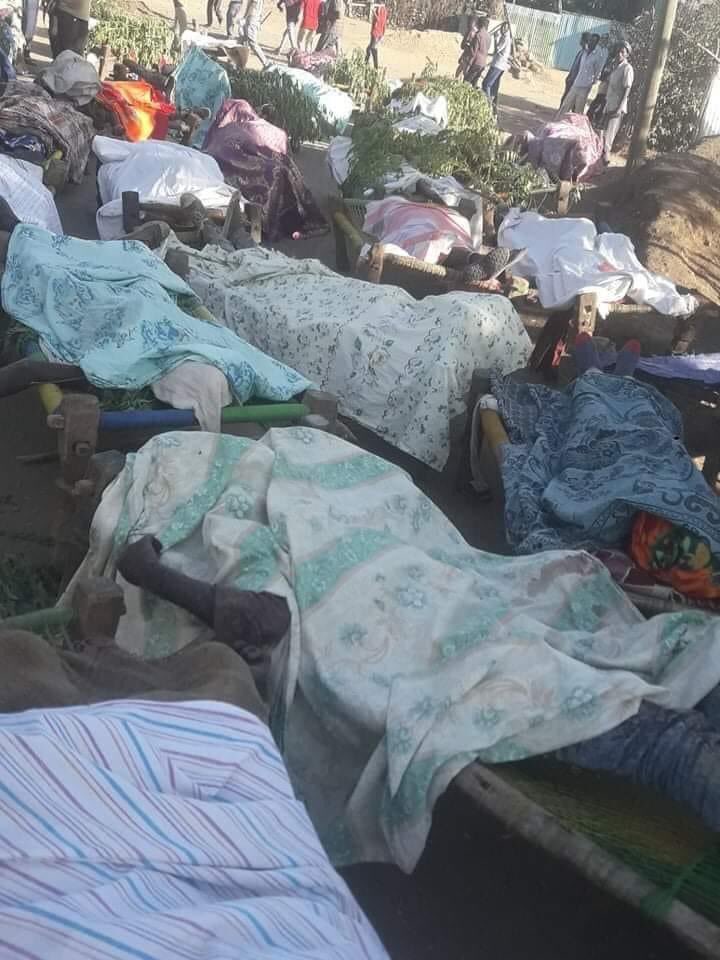
BY MENGESHA AMARE
The painstaking law enforcement operation in Tigray state was culminated effectively with the seizure of Mekelle town. The very reason that caused the law enforcement operation was the red line dashed by the TPLF clique via attacking the Northern Defense base behind.
Provoked by the ferocious attack on the national unwavering pillar—the defense force, the federal government started taking measures to ensure rule of law. Having annoyed by the law enforcement process, TPLF clique recruited factions perpetrated a severe massacre on innocent civilians at Mai-Kadra.
Following this appalling occurrence, citizens who have never had even a piece of knowledge about the existence of politics had killed and a number of mass graves are being found in different places. Targeting at having professional and legal outlook with regard to the issue of mass graves in relation to the international human rights law, The Ethiopian Herald approached Mesud Gebeyehu, Executive Director for the Consortium of Ethiopian Human Rights Organizations (CEHRO).
He said it is recurrently heard of from different media and the preliminary reports of the Ethiopian Human Rights Commission, Amnesty International and the Federal government about atrocious massacre in different parts of Tigray region, Especially the Mai Kadra report is very dreadful. We are working with members and partner organizations to conduct fact-finding missions on these allegations and as we get the full findings, we will be making the report public.
However, he said the preliminary reports suggest that these are grave human rights violations, most probably could be under the category of crime against humanity or war crimes, based on the evidences to be collected and the legal analysis we have. Those who perpetrated this disgraceful act will be responsible according to their level of participation. Such crimes are of course international crimes, and we also have sufficient legal remedies under the Ethiopian legal system. Basically, the issue of categorizing the level of crimes as crimes against humanity or war crimes highly demands credible and vivid evidences as well as legal analysis done in detail.
However, I strongly recommend that these alleged crimes shall be investigated by independent and professional institutions and the legal proceedings shall also be treated with special attention. In the lead up for the criminal accountability, the government shall also support and encourage independent investigations by Human Rights Organizations like ours and provide any technical support.
Apart from the criminal accountability, there should be a mechanism that families of the victims, wounded, and those exposed to psychological damage be healed, through an all-encompassing, participatory, and all inclusive transitional justice mechanism. The government should also coordinate the humanitarian assistance for the displaced, refugees and those whose properties are damaged because of the conflict.
As Civil Society Organizations (CSOs) are expected to be non-partisan, non-political and independent, it is possible to forward ideas based on viable evidences and plausible data collected from organizations working on the spot.
Basically, mass graves have been found all around the world and there is no definition of the term ‘mass grave’ in international law. Our common understanding is derived from pictures of history and news reports according to which ‘mass grave’ describes a site containing a multitude of human vestiges; a site of harrowing human loss, suffering and unimaginable acts of cruelty.
Mesud further stated that CEHRO, as a consortium of CSOs working on advocacy of human rights, democracy and conflict management, its mandate is mainly on capacity building, serving as a common platform for its members and strategic advocacy at national and regional level as well as serving as liaison for experience sharing among Ethiopian CSOs working on advocacy and other partner organizations with the same mission abroad like CIVICUS to which CEHRO is the Steering Committee member of Affinity Group of the National Associations (AGNA) under CIVICUS.
As part of capacity building, CEHRO connects its members with similar other organizations and those international Human Rights CSOs for technical support and experience sharing.
The protection of mass grave sites and their content is paramount since they provide invaluable information for both the prosecution of perpetrators of international crimes, and the realization of the right to truth, effective remedies and reparation for families of the deceased.
It is also well recognized that mass grave protection is required to facilitate evidence collection for criminal investigations and prosecutions, which in turn aims at achieving retributive justice as well as presenting a first step in assisting societies and individuals in the truth finding process. Evidence from mass graves has been successfully presented in numerous international criminal trials.
Responding to the question stating ‘A number of organizations working on human rights have come to Ethiopia. However, some are suspected to run hidden agendum under the guise of protecting human rights. What kind of surveillance mechanism have you employed to make them refrain from such a destructive move?, Mesud said that following the opening of the civic space, the number of CSOs working on human rights, democracy and conflict management is increasing day by day.
In the same fission, international CSOs working on advocacy are being registered by the Agency and some are getting permission from the Ministry of Foreign Affairs. Checking whether these organizations are working as per the law and in accordance with their statutes is mainly the duty of the regulatory bodies of the government. As such we have not mechanisms to check their work if they are working in compliance with the set regulations.
So far even I personally didn’t hear such complain from this perspective. However, if we are able to witness or receive credible information to this end, we have the duty to report for the concerned government authority. Civil Society organizations are expected to be non-partisan, non-political and independent.
This is the cardinal principle that any CSO shall operate. The CSOs Agency is also mandated to check and investigate if such reports/complaints are made against.
Protective legal guidelines are highly desirable as they help bring together different areas of law (international humanitarian, international human rights and international criminal law) on the dead and missing persons in an attempt to clarify obligations.
“We believe in constructive engagement with our partners and in case we feel that our partners are not yet complying with what they supposed to, we often remind them to comply with procedures and laws in place as this will finally entail a consequence which may affect their credibility, integrity and even legal accountability, he stated.”
The Ethiopian herald December 4/2020



